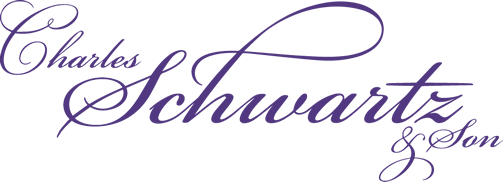For over a century, Charles Schwartz & Son has been a trusted jewelry retailer serving the Washington DC metro area and Chevy Chase, Maryland, specializing in vintage, antique, and estate jewelry. Known for exceptional quality and personalized service, our team helps buyers and sellers navigate the world of estate jewelry. Below, we answer the most frequently asked questions about buying, selling, and caring for estate jewelry in DC.
Jewelry experts located in Chevy Chase, MD & Washington, DC.
1. What is estate jewelry?
Estate jewelry is previously owned jewelry, often from private collections or estates.
Estate jewelry can include vintage, antique, or modern pieces that carry historical significance and unique design. Unlike new retail pieces, estate jewelry in DC offers collectors and buyers items with character, craftsmanship, and provenance that cannot be found in store-bought jewelry.
2. How is estate jewelry different from vintage or antique jewelry?
Estate jewelry is defined by prior ownership and unique craftsmanship, not just age.
While vintage and antique jewelry refer to age categories, estate jewelry is valued for its materials, design, rarity, and historical connections. In Washington DC, collectors often seek estate pieces for their artistry and story, not just because they are old. Learn more about the difference between antique, vintage & estate jewelry here.
3. How can I tell if a piece of jewelry is estate jewelry?
A piece qualifies if it was previously owned or part of a private collection.
To confirm whether jewelry is estate-quality, it’s recommended to get a professional appraisal. Even modern estate pieces can carry value based on materials, craftsmanship, and provenance. Charles Schwartz & Son in DC offers expert appraisal services to verify authenticity.
4. What should I look for when buying estate jewelry in DC?
Focus on craftsmanship, condition, authenticity, and provenance.
When buying estate jewelry in Washington, DC, look for high-quality materials, reputable designers, and unique gemstones. Verify condition, request documentation, and work with trusted jewelers like Charles Schwartz & Son to ensure you invest in genuine estate pieces.
5. What documents should I bring when selling my jewelry?
Bring certificates, appraisals, and receipts.
Documentation verifies your jewelry’s origin and condition, making the appraisal and selling process smoother. In DC, providing detailed paperwork ensures that estate jewelry is accurately valued and properly assessed by professional jewelers. If you’re unsure where to start for an appraisal, you can visit the National Association of Jewelry Appraisals to make sure you’re working with a credited professional. More information about appraisals at Charles Schwartz & Son is coming soon!
6. Can I sell inherited jewelry that I’m unsure about?
Yes, you can sell inherited jewelry even without full documentation.
Professional appraisers in Washington, DC can assess inherited estate pieces to determine authenticity and market value. This guidance helps you make informed decisions about selling or keeping family jewelry collections.
7. Do jewelers offer confidentiality when selling estate pieces?
Yes, reputable jewelers ensure confidentiality.
Many clients prefer to keep jewelry sales private, and professional jewelers in DC respect this by providing discreet, confidential service for both buyers and sellers.
8. How should I care for estate jewelry to keep its value?
Regularly clean, store properly, and repair by professionals.
It’s important to maintain a jewelry piece even if you’re not sure if you’re going to sell it. Damage could lower its value if you decide to sell or redistribute it. Make sure to have any piece repaired if needed and don’t let it sit in a drawer because leaving it could further damage it and lower its value. According to Rapaport Magazine, estate jewelry gained attraction on social media because of its natural storytelling element on unique history and craftsmanship that people love learning about.
9. Can estate jewelry be repurposed while keeping its value?
Yes, but alterations may impact its value.
Estate jewelry can be redesigned, but oftentimes maintaining original design elements and historical features is key to preserving or increasing its value. In other scenarios, redesigning a piece may bring more value to it. Always consult a professional before modifying a piece.
10. Should I sell or keep heirloom jewelry?
Keeping an heirloom jewelry depends on personal attachment, whether you wish to preserve a family legacy, and financial goals.
Keeping heirlooms preserves family history, while selling them can provide financial benefit. In Washington, DC, jewelers like Charles Schwartz & Son help clients evaluate sentimental and market value to make the best decision.
11. What should I do if I inherit a large estate jewelry collection?
Start with a professional appraisal.
A thorough appraisal in DC helps determine authenticity, value, and potential sale options. After consulting a professional, you can make informed decisions to keep, sell, or redistribute estate pieces according to their significance.




